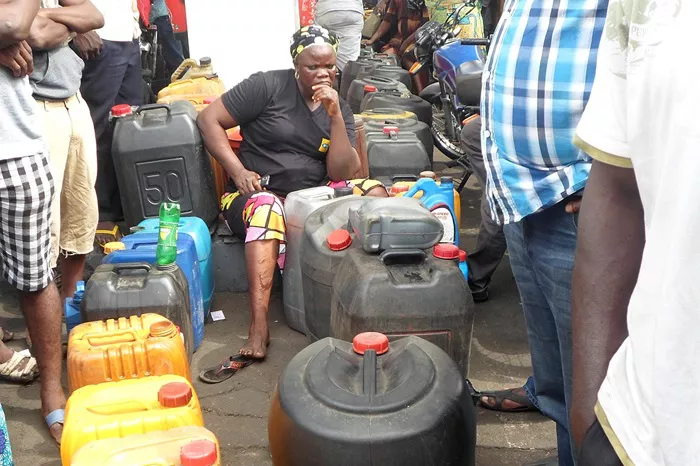Fuel scarcity is gradually surfacing in Lagos and other parts of Nigeria as private depot owners have increased the ex-depot price of petrol from N630 to N720 per litre. This development has exacerbated the fuel scarcity crisis in Abuja and surrounding states, with some filling stations dispensing Premium Motor Spirit (PMS) as high as N900 per litre.
Rising Prices and Scarcity
Reports indicate that numerous filling stations in Lagos, Ogun, and other states have exhausted their fuel supplies as they refuse to purchase high-priced fuel from private depots. According to the National Vice President of the Independent Petroleum Marketers Association of Nigeria (IPMAN), Hammed Fashola, many filling stations have not opened for business due to a lack of fuel in their tanks.
“The Nigerian National Petroleum Company Limited (NNPC), the sole importer of petrol, needs to explain to Nigerians what is happening with the product,” said Fashola. “Independent marketers cannot afford the high prices set by private depots, which are selling fuel between N715 and N720 per litre. This makes it impossible for marketers to sell the product at an affordable price for consumers.”
Supply Chain Challenges
The NNPC, which sells petrol to major marketers at prices below or around N600 per litre, has been urged by IPMAN leaders to supply petrol directly to independent marketers. However, this request has yet to be addressed. The third-party private depot owners previously sold PMS to independent marketers at rates between N630 and N650 per litre.
Fashola appealed to Nigerians to avoid panic buying and purchase only what they need to ensure the available fuel can go around. However, major marketers are selling petrol below N650 per litre, while independent marketers are selling between N750 and N800 per litre.
Government Intervention and Prioritization
In response to the fuel scarcity, NNPC officials have been seen at various depots in Apapa, directing depot owners to prioritize fuel supply to the Federal Capital Territory (FCT), Abuja, where fuel queues were first noticed. This has left Lagos and other areas with limited fuel supply.
The fuel supply gap has led to rationing by the NNPC, as highlighted by a recent Reuters report claiming Nigeria’s debt to fuel suppliers has exceeded $6 billion. The NNPC has struggled to cover the gap between fixed pump prices and international fuel costs, leading to late payments and reduced import quantities.
Market Reactions and Public Impact
Reports indicate that some marketers have refused to supply petrol to independent marketers due to limited supplies from the NNPC. This has caused many stations to run out of stock. In Lagos, queues have reappeared as residents fear a repeat of the severe fuel scarcity experienced in May.
During visits to various fuel stations across Lagos, it was observed that some stations had adjusted their prices upwards. For example, an NNPC outlet in Ikotun was selling petrol for N568 per litre, while a Petrocam outlet in Igando-Ikotun sold for N820 per litre. Long queues were evident at stations selling at lower prices.
Regional Variations
In Ogun State, petrol prices ranged between N700 and N800 per litre. A resident, Emmanuel Ogbonna, noted that major fuel stations were not dispensing fuel, indicating a return of fuel scarcity. In Ekiti State, filling stations sold petrol for between N650 and N760 per litre, with long queues at stations offering lower prices.
In Kwara State, petrol prices ranged from N600 to N750 per litre. In Edo State, prices varied between N660 and N730 per litre for major marketers, and between N700 and N900 for independent marketers. Long queues were observed at NNPC stations selling petrol at N591 per litre.
In Sokoto State, NNPC stations sold petrol at N620 per litre, while other stations sold between N720 and N900 per litre. In Kaduna, prices ranged from N720 to N800 per litre, with long queues at NNPC Mega stations selling at N620 per litre.
Continued Scarcity in Abuja
In Abuja, the fuel scarcity persisted with some filling stations selling PMS at N900 per litre. Major dealers sold petrol at between N660 and N690 per litre, while independent marketers charged higher rates. The ex-depot price of petrol has increased to over N710 per litre, and the added transportation and operational costs have pushed prices at smaller stations even higher.
The ongoing fuel scarcity and price hikes have caused significant disruptions and frustrations among motorists and residents across Nigeria. The NNPC and relevant authorities need to address these challenges promptly to restore stability to the fuel supply chain and ensure affordable prices for consumers.
Related topics:

